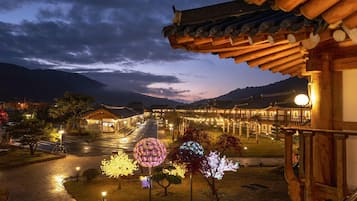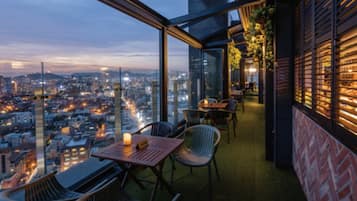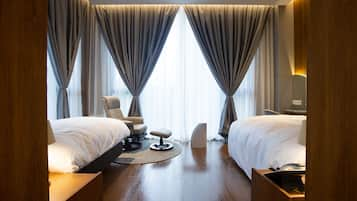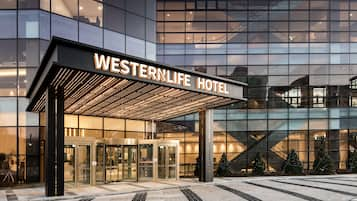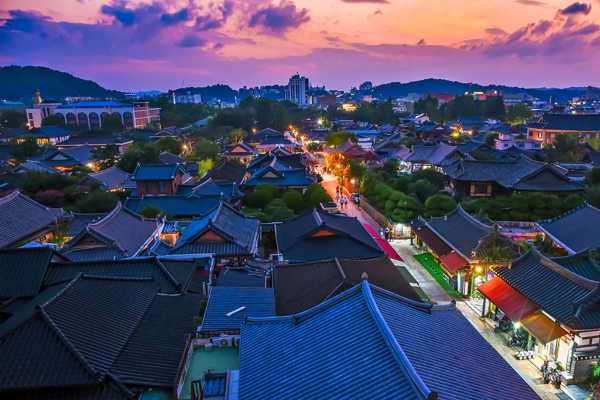Jeonju is a place filled with attractions where you can enjoy the beautiful natural scenery and experience tradition and culture for free. Take a walk along Jeonjucheon Stream, boasting clear first-class water, and then stop by Hanbyeokdang and Cheongyeollu Pavilions for outstanding views. You can also enjoy nature and relaxation on Moaksan Mountain overlooking Honam Plains.
Jeonju tourism cannot be discussed without mentioning Jeonju Hanok Village. This is a hot place where traditional experience facilities and cultural relics that are hard to find anywhere else are in harmony. Take a memorable photo in front of beautiful Jeondong Catholic Cathedral, and taste fragrant traditional wine for free at the Jeonju Korean Traditional Wine Museum. You might want to stop by hyanggyo, an educational institution from the Joseon Dynasty, and admire the old ginkgo trees. In Jeonju, many attractions that offer casual enjoyment without any entrance fees await visitors.
- 1
Jeonju Hanji Museum
Museum promoting the excellence and beauty of traditional hanji

- Budget
- History
At Jeonju Hanji Museum, you can learn about the culture and excellence of Korean traditional hanji. You can also examine in detail how hanji is made through cute models made with hanji. In addition to hanji, the museum also exhibits the kind of media that were used in the four major civilizations of Mesopotamia, Egypt, the Mediterranean Sea and China prior to the invention of paper. According to the exhibition, paper was not originally invented to record. It will be interesting to see for what purposes paper was invented and when it began to be used for recording.
In addition to the permanent exhibit, the special exhibit hosts an invitation event featuring the works of hanji craftsmen where you will experience something different to enjoy. You can also participate in the hanji making experience for free, so don’t miss out.
Location: 59, Palbok-ro, Deokjin-gu, Jeonju-si, Jeollabuk-do, Republic of Korea
Open: Tuesday–Saturday from 9 am to 5 pm
Phone: +82 (0)63-210-8103
Map - 2
Pungnammun Gate
Landmark that represents the city

- Budget
- History
- Photo
Pungnammun Gate, a symbol of Jeonju, is the only gate preserved to date among the east, west, north and south gates of the fortress surrounding Jeonju, which is why it is designated as Treasure No. 308. It was first built in the Goryeo period but was damaged during the period of the Joseon Dynasty. Thanks to recent repair work and renovation, it has been restored to its original appearance. The shape of Pungnammun is similar to Sungnyemun Gate in Seoul. A Statue of Peace sits in the plaza on the opposite side and it will be a meaningful time if you check it out as well.
Enjoy the beautiful view of Pungnammun at night. You will feel a different vibe of the gate with elegant lighting that illuminates the structure brightly. The gate itself boasts splendor. You can’t climb up onto the fortress wall or go inside but you can take selfies of your lifetime with the beautiful night view of Pungnammun in the background. Savor the mood of Pungnammun Gate, proudly protecting Jeonju, in various ways.
Location: 1, Pungnammun 3-gil, Wansan-gu, Jeonju-si, Jeollabuk-do, Republic of Korea
Phone: +82 (0)63-287-6008
Map - 3
Jeonju Hanok Village
Traditional culture experience enjoyed in the center of the city

- Budget
- Couples
- Families
- History
In Jeonju Hanok Village, you can experience the culture and traditions of the old Joseon Dynasty for free. This village, which is home to around 700 hanoks forming a community in the Pungnam-dong area of Jeonju, features many cultural facilities throughout the town, which enables visitors to encounter different elements of the culture including hanok, Korean food, hanji and hanbok in a single location.
The cultural commentary tours exploring the Hanok Village are available for free and run each hour. There are eight courses under different themes providing you with a wide range of choices. However, you need to inquire about the schedule and make reservations in advance. Feel different vibes in every corner of Hanok Village and enjoy the beautiful scenery. If you go on a stamp tour, you will be able to enjoy the attractions of Hanok Village to the fullest.
Location: 99, Girin-daero, Wansan-gu, Jeonju-si, Jeollabuk-do, Republic of Korea
Phone: +82 (0)63-282-1330
Map - 4
Jeondong Catholic Cathedral
Beautiful structure that comforts the souls of martyrs

- Budget
- History
- Photo
Constructed in the early 20th century, Jeondong Catholic Cathedral is one of the most beautiful buildings in Korea, combining Byzantine and Romanesque styles. It is the largest and oldest Western-style building in the Honam region, and is also the site where many Catholics, including the first martyrs in Korea, were executed.
Across the street from Jeondong Catholic Cathedral, a holy place of the Catholic Church, stands Gyeonggijeon, which is considered as a shrine from the Joseon Dynasty, and also Pungnammun Gate of Jeonju Fortress. When visiting the area around the cathedral, you will be able to see a unique combination of eastern and western architecture. Since there is no entrance fee, feel free to visit and take memorable pictures with the unique cathedral in the background. You can spend some valuable time looking back on history while enjoying the splendid, antique cathedral.
Location: 51, Taejo-ro, Wansan-gu, Jeonju-si, Jeollabuk-do, Republic of Korea
Open: Daily from 9 am to 6 pm
Phone: +82 (0)63-284-3222
Map - 5
Deokjin Park
Park with a lake full of beautiful lotus flowers in its arms

- Budget
- Couples
- Families
Deokjin Park, located in the center of downtown Jeonju, is a park that holds the vast Deokjinho Lake. The lake is embroidered with lotus flowers every July, gaining huge popularity among not only Jeonju citizens but also tourists from all over the country. The lotus flowers of Deokjinho are called “Deokjip Chaeryeon” and are regarded as one of the Eight Scenic Views of Jeonju. You can enjoy an outstanding view of the lake while crossing Yeonhwagyo Bridge, a newly built marble bridge, and you can also savor the tranquil atmosphere of the lake at the wooden Yeonjigyo Bridge and Yeonjijeong Pavilion. You shouldn’t leave out the musical fountain that unfolds before you in the lake.
In this place that is filled with the scents of lotus flowers, look for monuments of poets who brought honor to the literary history of Jeonju. You will be able to feel moved when you encounter statues of various poets including Shin Seok-jeong and Kim Hae-gang and a line from a collection of poems.
Location: 390, Gwonsamdeuk-ro, Deokjin-gu, Jeonju-si, Jeollabuk-do, Republic of Korea
Phone: +82 (0)63-239-2607
Map - 6
Moaksan Mountain
Beautiful mountain where you can encounter radiant Buddhist arts

- Adventure
- Budget
Located in the southeastern part of Jeonju, Moaksan Mountain is designated as a provincial park, and Geumsansa Temple located on the mountain boasts excellent spring scenery, which is considered one of the Four Scenic Views of Honam. Legend has it that the name “Moak” comes from a rock at the top, which resembles a mother holding a baby. Particularly in spring, the entire mountain is covered with dark pink cherry blossoms and azaleas that produce quite a spectacle. Once you walk past Daewonsa and Suwangsa Temples and climb up a slightly steeper path to the top, you will be able to overlook downtown Jeonju and the Honam Plains in a single view.
Geumsansa, a famous temple built during the Baekje period, also lies on Moaksan. Geumsansa houses around 10 treasure-level relics, so make sure to visit and study the radiant Buddhist arts.
Location: Gui-myeon, Wanju-gun, Jeollabuk-do, Republic of Korea
Phone: +82 (0)63-290-2752
Map - 7
Jeonju Korean Traditional Wine Museum
Where you can enjoy aromatic traditional wine

- Budget
- Couples
- History
Jeonju Korean Traditional Wine Museum is a place that continues the existence of Gayangju and enables visitors to experience various Korean traditional wines. Gayangju refers to the liquor, or the culture behind the liquor, brewed by each household in the traditional method without any chemical additives. The museum, which offers free admission, is divided into two spaces - Gyeyeongwon that displays and sells various traditional wines from all over the country and Yanghwadang that exhibits wine brewing tools and process.
Through the permanent program, you can listen to a simple commentary for free and also participate in a traditional wine testing experience. If you pay a small fee, you can also try brewing wine or making Gayangju yourself. There are also many other experience programs available, so it would be nice to check them out in advance before you visit. Do not miss the opportunity to enjoy traditional wine with both your eyes and mouth.
Location: 74, Hanji-gil, Wansan-gu, Jeonju-si, Jeollabuk-do, Republic of Korea
Open: Tuesday–Sunday from 9 am to 6 pm
Phone: +82 (0)63-287-6305
Map - 8
Jeonjuhyanggyo Local Confucian School
Place where Confucian scholars honed in their studies

- Budget
- Couples
- Families
- History
Jeonjuhyanggyo is a place where you can take a peek at the kind of education Confucian scholars received during the Joseon Dynasty. At the center of hyanggyo stands Daeseongjeon Shrine, where tablets of the five saints of Confucianism - Confucius, Yan Hui, Zisi, Zengzi and Mencius - are enshrined. Located behind Daeseongjeon is Myeongnyundang Lecture Hall, which was used for education, and, on the left and right are Dongjae and Seojae, which were dormitories for Confucian scholars. Magnificent ginkgo trees that are around 400 years old stand tall in the front yard of Daeseongjeon and Myeongnyundang. The ginkgo trees symbolize the upright nature of Confucian scholars since they are not harmed by insects or do not rot easily. They continue to attract many people who come to see the yellow ginkgo trees in autumn.
Jeonjuhyanggyo is also a famous location for the dramas, “Love in the Moonlight” and “Sungkyunkwan Scandal.” The road around the wall surrounding hyanggyo is perfect for enjoying the Korean atmosphere with a tranquil vibe. Located inside the Hanok Village, Jeonjuhyanggyo is easily accessible without any additional admission fee. Make sure to stop by and feel the relaxing atmosphere.
Location: 139, Hyanggyo-gil, Wansan-gu, Jeonju-si, Jeollabuk-do, Republic of Korea
Open: Daily from 9 am to 6 pm
Phone: +82 (0)63-288-4544
Map - 9
Jaman Mural Village
Must-visit photo spot where you can enjoy diverse murals
- Budget
- Couples
- Families
- Photo
Jaman Mural Village in Jeonju was originally a poor hillside village formed by refugees of the Korean War but it gained a new reputation when murals began to be painted on every wall and street corner as a part of the Green Dulle-gil Project. Recently, old murals have been repaired and painted anew to give the village a brighter feel. You can get to Jaman Mural Village, located on a ridge of Seungamsan Mountain, just by walking across the street from Jeonju Hanok Village. When you take pictures in front of the murals painted under various themes such as flowers, animals, people and characters, they will become instant works of art.
The village is lined with numerous workshops, cafes, snack shops and guest houses throughout. These stores donate a portion of their profits for the operation of the village so, if the murals have impressed you, we recommend you to visit a store or fine some accommodations you like.
Location: Gyo-dong, Wansan-gu, Jeonju-si, Jeollabuk-do, Republic of Korea
Map - 10
Jeonjucheon Stream
Clean stream that has restored nature
- Budget
- Couples
- Families
Jeonjucheon Stream, which flows from southeast to northwest of Jeonju, is both a trail and a biking course that Jeonju citizens love to use. Stop by Jeonju Eco Museum when the trail begins. Here, you can learn about the effort the city of Jeonju has put in to resurrect the once-polluted Jeonjucheon. It is now a Grade 1 stream where a variety of fish including slender shiners and Chinese minnows as well as mandarin ducks and the endangered otters live. Among plants, pussy willows and silver banner grass create quite a spectacle.
Another famous attraction is Hanbyeokdang Pavilion. The surrounding scenery is known as “Hanbyeok Cheongyeon,” which is regarded as one of the Eight Scenic Views of Jeonju. Mist rises when stream water, which flows around the pure Seungamsan Mountain, reaches Hanbyeoknu, and it is an unrivaled sight to see. Soon after, you will reach Namcheongyo, one of the many bridges on the stream. There is a pavilion called Cheongyeollu over the bridge and it creates a magnificent view especially at night when lights are illuminated, so make sure to stop by.
Location: Palbok-dong 1-ga, Deokjin-gu, Jeonju-si, Jeollabuk-do, Republic of Korea
Map






